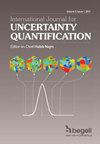基于入侵多项式混沌的随机湍流建模中模型形式不确定性的量化与传播
IF 1.8
4区 工程技术
Q2 ENGINEERING, MULTIDISCIPLINARY
International Journal for Uncertainty Quantification
Pub Date : 2023-01-01
DOI:10.1615/int.j.uncertaintyquantification.2022039993
引用次数: 1
摘要
尽管存在固有的局限性,基于reynolds -average Navier-Stokes (RANS)的建模仍然被认为是几种计算流体动力学(CFD)应用中最受认可的方法。最近,在湍流模拟界,RANS中模型形式不确定性的量化引起了极大的兴趣。本文提出了一种随机RANS求解器,并在OpenFOAM中有效地实现了入侵多项式混沌(IPC)方法。随机求解器量化和传播与RANS模型(涡流粘度或雷诺应力张量)输出相关的不确定性。考虑了不确定性的两个不同的高维变量,即随机涡流黏度场(REVF)和随机雷诺应力张量场(RRSTF)。在保证可实现性的同时,引入了涡流黏度近似场和雷诺应力张量的随机性。随机RANS求解器已经在RANS湍流建模的各种基准问题上进行了测试。在本研究中,我们讨论了两个重要的问题,其中随机RANS求解器比传统的不确定性量化(UQ)方法表现出明显更好的性能。分析的第一个问题是带REVF的周期性山丘的流动,而考虑的第二个随机问题是带RRSTF的方形管道中的流动。通过对三种不同的RANS湍流模型的比较,详细分析了基于各种影响模型参数的随机求解方法。基于IPC的随机求解器展示了在进一步复杂CFD应用的UQ分析中使用的潜力,特别是在大量确定性模拟不可行的情况下,例如风电场CFD模拟。本文章由计算机程序翻译,如有差异,请以英文原文为准。
QUANTIFICATION AND PROPAGATION OF MODEL-FORM UNCERTAINTIES IN RANS TURBULENCE MODELING VIA INTRUSIVE POLYNOMIAL CHAOS
Undeterred by its inherent limitations, Reynolds-averaged Navier-Stokes (RANS) based modeling is still considered the most recognized approach for several computational fluid dynamics (CFD) applications. Recently, in the turbulence modeling community, quantification of model-form uncertainties in RANS has attracted significant interest. We present a stochastic RANS solver with an efficient implementation of the intrusive polynomial chaos (IPC) method in OpenFOAM. The stochastic solver quantifies and propagates the uncertainties associated with the output of the RANS model (eddy viscosity or Reynolds stress tensor). Two distinct high-dimensional variants of the uncertainties are considered, namely, the random eddy viscosity field (REVF) and the random Reynolds stress tensor field (RRSTF). The randomness is introduced in the approximated eddy viscosity field and the Reynolds stress tensor, while asserting the realizability. The stochastic RANS solver has been tested on various benchmark problems for RANS turbulence modeling. In this study, we discuss two important problems where the stochastic RANS solver shows significantly better performance than the traditional uncertainty quantification (UQ) methods. The first problem analyzed is the flow over periodic hills with a REVF, while the second stochastic problem considered is the flow in a square duct with a RRSTF. Along with the comparison for three different RANS turbulence models, a detailed analysis of the stochastic solver based on various influential model parameters is also presented. The IPC based stochastic solver demonstrated the potential to be used in the UQ analysis of further complex CFD applications, especially when a large number of deterministic simulations is not feasible, e.g., wind farm CFD simulations.
求助全文
通过发布文献求助,成功后即可免费获取论文全文。
去求助
来源期刊

International Journal for Uncertainty Quantification
ENGINEERING, MULTIDISCIPLINARY-MATHEMATICS, INTERDISCIPLINARY APPLICATIONS
CiteScore
3.60
自引率
5.90%
发文量
28
期刊介绍:
The International Journal for Uncertainty Quantification disseminates information of permanent interest in the areas of analysis, modeling, design and control of complex systems in the presence of uncertainty. The journal seeks to emphasize methods that cross stochastic analysis, statistical modeling and scientific computing. Systems of interest are governed by differential equations possibly with multiscale features. Topics of particular interest include representation of uncertainty, propagation of uncertainty across scales, resolving the curse of dimensionality, long-time integration for stochastic PDEs, data-driven approaches for constructing stochastic models, validation, verification and uncertainty quantification for predictive computational science, and visualization of uncertainty in high-dimensional spaces. Bayesian computation and machine learning techniques are also of interest for example in the context of stochastic multiscale systems, for model selection/classification, and decision making. Reports addressing the dynamic coupling of modern experiments and modeling approaches towards predictive science are particularly encouraged. Applications of uncertainty quantification in all areas of physical and biological sciences are appropriate.
 求助内容:
求助内容: 应助结果提醒方式:
应助结果提醒方式:


